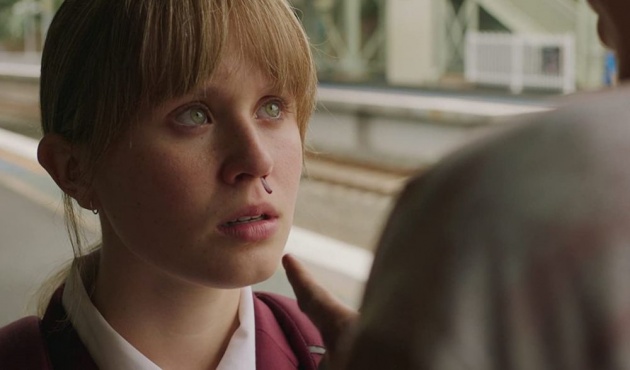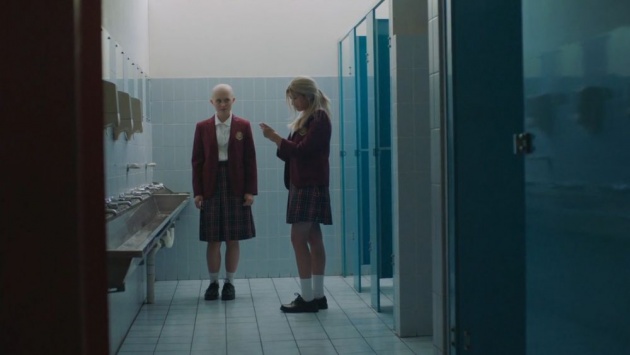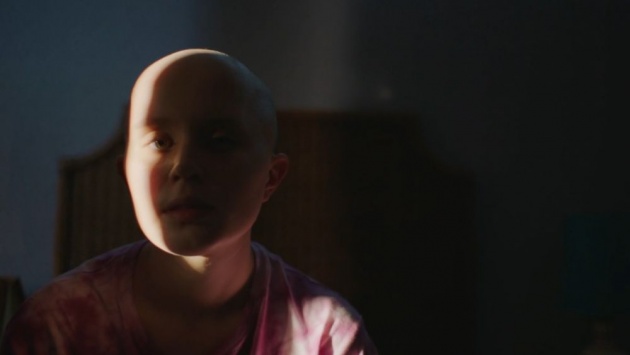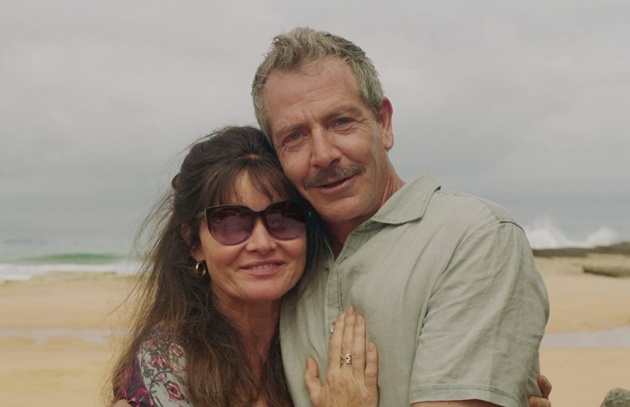
Pictured: Milla (Eliza Scanlen) has a nosebleed in an early scene from the film 'Babyteeth', written by Rita Kalnejais (based on her 2012 stage play) and directed by Shannon Murphy. Still courtesy of Jan Chapman / PictureHouse Entertainment
Contains spoilers
Adapted by Rita Kalnejais from her 2012 play and directed by Shannon Murphy, Babyteeth is an antidote to Love Story. Films about men who fall in love with women who have fatal diseases inevitably end badly, but usually tug on the heartstrings. We imagine the life the young couple could have enjoyed together and blub uncontrollably. We empathise, which is to say we relate their loss to any loss that we have experienced, be it of a person or family pet (but usually a person). Some of us identify, because we have had the sad, sickening misfortune of losing the partner we love in the prime of youth.
Set in a leafy suburb of Sydney, Australia, Babyteeth elicits neither identification nor empathy because it is nihilistic. It posits suicide at the beginning and suggests a mercy killing at the end. The main character, sixteen-year-old Milla (Eliza Scanlen) lives in her own bubble of inevitability. At the beginning, we see her in her school uniform trembling on a train platform, standing apart from other schoolgirls. We can read her thoughts without voiceover: ‘I’m going to do it. Today, I’m going to do it.’ But just as the train approaches, Moses (Toby Wallace) runs out in front of her with arms outstretched to catch the breeze – that is, the feeling of carriages rushing past. Whether he did it to save Milla, or whether it is just coincidence, we are not sure. No one really talks about their feelings, which is deliberately ironic since Milla’s father, Henry (Ben Mendelsohn) is a psychiatrist. Instead, they retreat into their own worlds. Henry’s practice is opposite his house; he spares himself the daily commute.
Moses, we later discover, is twenty-three-years-old. He is impulsive, which is a euphemism for saying that he is high all the time. In a state of shock, Milla does not board the train. Her nose starts to bleed. Moses gives her his shirt to stem the bleeding, cradling her head as he covers her face. ‘Would you mind not covering my face?’ asks Milla, assuming a belated sense of propriety. Another train passes by. Moses tells her he has been kicked out of his place. ‘You’ve been evicted,’ she says, as if teaching him a new word. We sense that she believes Moses did not have much schooling. ‘Do you have any money?’ ‘I’ve only got fifty dollars,’ replies Milla, pulling out a blue envelope. We will later discover it is for a haircut. ‘That’s too much,’ says Moses. Milla is insistent. As the next train pulls in, Moses bounds on it. ‘Are you getting on this one?’ Now composed, Milla proposes an agreement: ‘for fifty dollars, you have to do something for me’.
This turns out to be a haircut. Moses’ mother is an award-winning poodle shearer. ‘She has won three competitions,’ Moses later reveals with genuine pride. Moses may voice this, but he is not above breaking into his mother’s home to use her clippers on Milla, whose blonde locks are rendered short and ragged, somewhere between Joan of Arc and an emo. As you would expect in Australia, there are emos everywhere. Moses’ mother, Polly (Georgina Symes) and (half) brother, Isaac (Zach Grech) surprise him. She calls the police to report a break in; Moses and Milla make a dash for it. On his way out, Moses knocks over the recycling bin, because when it comes to middle-class households, you got to hit them where it hurts.

Pictured: When Milla (Eliza Scanlen) met Moses (Toby Wallace). An early scene from the film, 'Babyteeth', written by Rita Kalnejais and directed by Shannon Murphy. Still courtesy of Jan Chapman Films / PictureHouse Entertainment
Moses is a surprise guest at Milla’s family home. Her mother Anna (Essie Davis) is high. Earlier that day, Anna arranged a 4:00pm appointment in her husband’s office for sex, wearing the bra that he likes. They do not do it on the couch, which has no back support, rather she sits on Henry’s desk, unbuttoned, leaving him to prescription duties. Henry is not in the mood for intimacy; he is eating a sandwich. Anna tears it from his hand and flings it to one side, inviting him in. Henry’s exertions are interrupted by a phone call, which he takes. He does not appear to have a receptionist; or at least there was not one in Kalnejais’ original play.
In the world of this film, there is plenty that is missing, for example the father of Anna and Henry’s new neighbour’s child. Toby (Emily Barclay) is heavily pregnant and moved in with her dog but not her significant other. Wait, maybe her ice lolly is her significant other or maybe her cigarette. When we first meet her, she is calling out for her dog, Henry. Milla’s father responds as if out of habit. Surely, it would be to ‘doctor’. At any rate, after being reluctant to leave her when his name is being called, he explains that he is called Henry. ‘That’s a dog’s name,’ blurts Toby. At any rate, after a discussion about her smoking habit – Henry chastises her but Toby explains that a study explained it was OK to smoke during the third trimester (‘no, it isn’t,’ Henry responds disbelievingly) – he heads to work. She has an electrical problem, but Henry cannot spare the time.
Back to dinner and Anna is not in a fit state to disapprove of Moses. He is covered in tattoos, including one on his left cheek that says ‘le loup’ (the wolf). Moses’ attitude to tattooing is to treat his body like a jotting pad, or a school desk. Every tattoo is random. Even his ear is coloured in black ink. I guess if he turns it towards you, he is not really listening. He does not talk about his tattoos – no one does – but Anna objects to him smoking at the table. He leaves, after revealing his age and that he is in informal work. His relationship with Milla is described as ‘inappropriate’.
However, Moses returns the next night, ostensibly to steal some meds. He threatens Anna with a meat prong. ‘I wasn’t going to use it,’ he insists later. Anna helps him pick out the best medicines for his addiction. Milla comes downstairs, her head completely shorn of hair. ‘That’s better than I did it,’ Moses says, beaming. Henry comes downstairs too. Milla asks them not to report Moses to the police (‘that’s perpetuating the cycle’). Rather, she remarks: ‘it’s almost morning. Can he stay for breakfast?’
After breakfast (crepes), during which Milla puts on her school uniform and new blond wig in double-quick time, Anna drops Milla off at school and offers to take Moses to his family. Whilst the car is moving, Moses bolts, forgetting his bag. He comes back for it sheepishly. ‘You are not to see my daughter again,’ Anna tells him sternly.
See her, he does, right after school. But first: the embarrassing wig scene. Milla is in the ladies’ room and a school friend, Scarlett (Michelle Lotters) asks to try on her wig. Milla is reluctant to peel away a piece of herself (so to speak) for another girl’s pleasure. She acquiesces; Scarlett looks at how transformed she is and takes a selfie ‘for her hairdresser’. But Milla has been violated. We feel it. This is one of the few scenes where we empathise with Milla: for every moment we have let one of our friends try on a tee shirt and they look better in it than we do and we feel like s-t.

Pictured: The humiliation of loaning out one's wig. Eliza Scanlen and Michelle Lotters in a scene from the Australian film, 'Babyteeth'. Still courtesy of Jan Chapman Films / PictureHouse Entertainment
‘What are you doing here outside my school?’ asks Milla, greeting Moses outside. ‘This is my school,’ he explains, proprietorially. ‘It’s an all-girls school,’ she remarks. You feel we should be laughing, but Moses exudes such an air of wastefulness that we never feel comfortable enough to enjoy the dialogue. At one point, he tells her that she cannot hang out with him; he is working. But she watches him do a deal with an Asian kid, Dom (Jaga Yap) who in turn invites her to a party. Sure enough, they go, but at the party Moses meets his age-appropriate girlfriend, who looks at Milla disparagingly. ‘What are doing babysitting?’ the girl asks before applying her mouth to Moses’ cheek. Milla asks Dom to get her a drink and dances. The mood lighting makes us see her differently: she is tripping. An older woman dressed in a skin-tight top gets close to Milla and, how can I put it, ‘fondles her aura’. This is to say that she does not put her hands on Milla but mimes moulding the space around her. The gesture threatens intimacy but does not achieve it.
At a certain point, Moses exhausts his girlfriend’s company and drags Milla off the dance floor, separating her from Dom, who puts up a struggle because he has put in the hours. Outside, Milla vomits. ‘What did you take?’ he asks. ‘Vodka.’ ‘Are you supposed to have that with your medication?’ ‘It never came up.’ Again, you sense the joke, but no one in the audience is laughing. In a section captioned ‘Romance (Part Two)’ – the whole film is captioned – they dance in a restaurant in front of a man singing karaoke. Murphy shows the lyrics on the screen accompanied by images of a steak being prepared for cooking. Milla and Moses end up on the roof; Moses leaves her. Her parents find her much later. The next time we see Milla, she is in hospital.
Music is important to Milla’s family. Milla has learnt to play the violin but (literally) drops the instrument in a heated row with her mother. Milla has a tutor, Gidon (Eugene Gilfedder) who at one point taught Milla’s mother. He watches Milla play with distaste; it is as if Milla treats music as an obligation rather than a source of joy. A small boy, Tin Wah (Edward Lau) watches. He explains he has missed the bus. ‘Yeah, sure,’ says Milla. She puts on a record and starts dancing. Tin Wah watches her also as does Milla’s mother, who slips into the room unannounced, and smiles.
There is one scene in which we are invited to see Moses sympathetically – when he asks Isaac (‘buddy’) to let him in to his mother’s apartment. Isaac shakes his head. Moses raises his voice. The dogs – three poodles, all in cages – bark. Isaac leaves the room. There are moments when Milla realises that Moses only hangs out with her for the drugs. As her condition deteriorates, Henry bribes Moses to stay in their house; he can get him all the drugs he needs.
The film appears to be building to a formal (dance) at which Milla will take Moses. After buying the tickets at school, Milla is disappointed that Moses is not outside waiting to meet her. She finds him on a basketball court. Anna buys Milla a dress. She tries it on. She has a new wig too, blue green, inspired by the party lights and matching the dress. However, Milla’s health is a factor. At no point do we see her with doctors – it is clear she has cancer. She takes tablets, but at no point do we witness her prognosis – another aspect of the film that is missing. Anna knows that Milla’s spirits are raised when Moses is around. She takes a slice of watermelon and eats it as she looks through a window at Milla and Moses. ‘This is the worst type of parenting,’ she remarks to Henry, who nods.
Henry has his own subplot. In a section captioned ‘Breakthrough’, he leaves a patient on the couch (complaining about her ex, ‘don’t leave me’) and offers to fix the bulb for Toby. He fits it, but then gets electrocuted and thrown off a stool. Henry’s hair is sticking up. Toby’s response is to apply hair gel. We should laugh but we do not. In their third scene together, Toby offers him a drink (in the daytime) to celebrate unpacking her cups. ‘What did you use in the meantime?’ Henry asks. They get close together in her garage and he kisses her. He retreats almost immediately. ‘Sorry,’ he explains and then, ‘sorry’. Toby is not sorry but instead looks at him with compassion that seems genuine. They have a connection, unlike any other couple in the film, except for maybe Gidon and Anna.
There is a Christmas-slash-birthday party. A caption tells us that ‘Everybody is invited’. Moses dances for the assembled crowd. Then Toby’s water breaks. The adults, plus Tin Wah and Isaac all leave, leaving Milla and Moses behind. They go up to her room. Milla’s baby tooth falls out. She puts it in a glass of water (the image that opens the film, first shown in slow motion and set to The Stranglers’ song, ‘Golden Brown’). She then asks Moses to suffocate her. He refuses, then puts a pillow over her face. She is acquiescent at first, but then her body fights back. Moses removes the pillow as Milla gasps for air. They make love. The next morning, Moses comes down for breakfast. Anna goes to Milla’s room and discovers Milla is dead. She curses Moses: she did not get to say goodbye. The most cynical members of the audience believe that Moses killed her because he did not want to father a child nor be accused of statutory rape.
There is an epilogue. In fact, it is a flashback, captioned ‘The Beach’ and set by the sea. Toby is there, sunning herself, her pregnant belly is beachball sized under her blue swimsuit. Moses is in the water. Henry takes a picture of Milla. She offers to take one of him. She takes the camera. Henry tells her how to focus. ‘I know how to use the camera, Dad’. We see the beach through the camera lens, as Milla points the camera towards the clouds. The credits roll. The ending is meant to be moving – this is what Milla has lost. But I sat and felt nothing.
There are family rows not featured in the above summary: Henry complaining that Anna sucks up the oxygen of despair in the relationship, not allowing him to show his emotions. Anna sees Henry administering morphine to himself. ‘It’s just a one-off,’ he explains. Milla accuses Henry of drugging her mother and doing the same to Moses. However, there is a point at which Moses appears to be going cold turkey – drinking water and biting into a sandwich. He throws up into a conveniently placed bucket. You watch this and think, a little more signposting would not go amiss; Moses did not look like wanting to get clean.

Pictured: Crescent light. Eliza Scanlen in a scene from the Australian film, 'Babyteeth'. Still courtesy of Jan Chapman Films / PictureHouse Entertainment
On one level, Babyteeth is a behavioural comedy about middle-class mess-ups, who understand psychology and correct behaviour but who cannot function. Incidentally, the absence of grandparents makes the action seem even more false. However, there is no one character who will transform the others - no epiphanies. You feel trapped in a world where everyone feels wretched. You do not laugh at them, because to some extent you share their values; you studied their curriculum. You do not feel an authorial world view either. Murphy can give us an arresting image – a crescent light illuminating the curve of Milla’s face. But I felt a sense of detachment. I could certainly see the material working on stage – minus the beach epilogue – and getting big laughs. The play directly addressed the moneyed, artsy middle-class audience watching it. On screen, it made the audience feel that they were not amongst friends. The liberal middle-classes who might closely identify with it are reluctant to engage in front of others from different social groups. This is a film that does not turn the specific into the universal because in our universal, we want to feel better about the choices the characters’ made. The title hints at a metaphor, but not one that comes to life. It makes for a curious spectacle.

Pictured: Essie Davis and Ben Mendelsohn in the climactic beach scene of the film 'Babyteeth', written by Rita Kalnejais and directed by Shannon Murphy. Still courtesy of Jan Chapman Films / PictureHouse Entertainment
Reviewed at Cineworld Wood Green, Screen Five, North London. 19:00 screening (second viewing). First seen at London Film Festival, Odeon Tottenham Court Road, Tuesday 8 October 2019, 12:45 screening.



